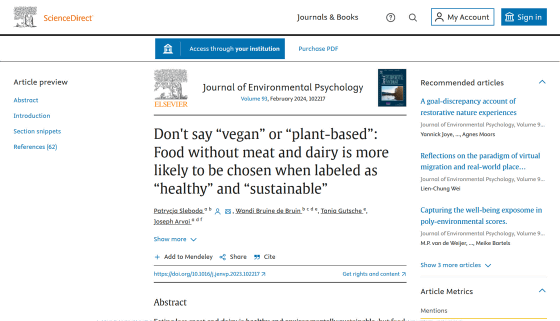It turns out that people lose interest in eating when plant-based meals are labeled as ``vegan'' or ``plant-based''

In recent years, many
Don't say “vegan” or “plant-based”: Food without meat and dairy is more likely to be chosen when labeled as “healthy” and “sustainable” - ScienceDirect
https://www.sciencedirect.com/science/article/abs/pii/S0272494423002657

One Simple Trick Could Make More People Eat Vegan Food : ScienceAlert
https://www.sciencealert.com/one-simple-trick-could-make-more-people-eat-vegan-food
A research team led by Patricia Sleboda , a psychologist at the University of Southern California , recruited more than 7,300 participants to find out, ``How can more people choose plant-based foods?'' We conducted an online experiment.
In the experiment, subjects were presented with a ``food assortment gift that includes meat and dairy products'' and ``a food assortment gift that does not contain meat or dairy products,'' and a survey was conducted to see which gift the subjects would choose. The ``Meat and Dairy Free Food Assortment Gifts'' are randomly labeled with five types: ``Vegan,'' ``Plant-Based,'' ``Healthy,'' ``Sustainable,'' and ``Healthy and Sustainable.'' Subjects are divided into five teams according to the labeling presented. In addition, the subjects were not informed that there were labels other than those presented to them.

As a result of the experiment, regardless of the labeling conditions, ``Gifts containing meat and dairy products'' were the most popular, but ``Gifts containing food assortments that do not contain meat and dairy products'' were chosen more often. It varied depending on the label given.
The least popular option was 'vegan', chosen by only 20% of the assigned subjects. The next least popular option was 'plant-based', with only 27% choosing it. On the other hand, it was reported that 42% of subjects chose the label if it said 'healthy,' 43% if it said 'sustainable,' and 44% if the label said 'healthy and sustainable.' showed that the proportion of people choosing plant-based foods more than doubled.
The research team said, ``This labeling effect was consistent across sociodemographic groups, but was strongest among those who ``prefer to eat red meat.''

Because this survey was conducted online, it may only reflect trends in online shopping. However, this result reflects a ``cultural rejection of veganism'' seen in the wider community. Science media Science Alert states, ``Anti-vegan'' groups have appeared on the Internet, and prejudice against vegans is very strong. '
However, studies have shown that even meat eaters support the health, environment, and ethics behind veganism. It's also true that a plant-based diet has a variety of health benefits, including being associated with lower blood pressure and reduced risk of diabetes .
Some psychologists believe that the contradiction between ``I understand that a plant-based diet is good for my health and the environment, and I don't feel comfortable harming animals, but I like eating meat'' is a cognitive phenomenon. He points out that this may be causing dissonance . The existence of vegans is an unpleasant existence that makes people aware of this contradiction, so it seems that people may have a strong feeling of rejection towards vegans.
The way to reduce this anti-vegan bias is not to follow strict veganism in which you don't eat any meat at all, but to have a more relaxed approach such as ``reducing your consumption of animal products, but not overdoing it, and eating meat when you want to.'' It has been proposed to 'encourage flexitarianism '. Even small reductions in meat consumption have benefits, and are easier to achieve and more sustainable.
The results of this study also suggest that people would feel less reluctant to promote a diet that does not contain meat or dairy products by using words such as 'healthy' and 'sustainable' rather than using words such as 'vegan.' It suggests that. Sreboda et al. concluded that 'labeling is a low-cost measure to promote healthy and sustainable food choices.'

Related Posts:







